Religious statues and figurines are devotional items that are especially prized and revered by their owners. Damage to a favorite figurine can generate great remorse because religious statues carry such vivid family memories. Handed down through the generations, they are housed in personal shrines or brought out at Christmas in Nativity scenes or other displays.
Larger statutes are prominently placed in churches and chapels where they serve as symbolic objects of reverence with special significance for the congregation.
Most religious statues are made from hand-painted plaster that is fragile & easily damaged. Special skill is required to restore while preserving the patina.
Artistry in Glass has developed expertise in the sensitive restoration of religious statues and figurines.
Religious statuary
Religious statuary for the Roman Catholic church inherited the tradition of classical art from ancient Greece and Rome where monumental figures were sculpted from marble.
This art form reached an early peak in the works of Renaissance masters like Michelangelo, Donatello, and Leonardo da Vinci in Florence and Rome.

Copy of Michelangelo’s sublime Pietà from St Peter’s Basilica in Rome. Original Roman Catholic statuary was sculpted in white Carrera marble.
Religious statues made of plaster or wood
Hand-sculpted marble is too labor-intensive to be affordable for the mass market and so reproductions for sale to the public were manufactured out of plaster or wood.
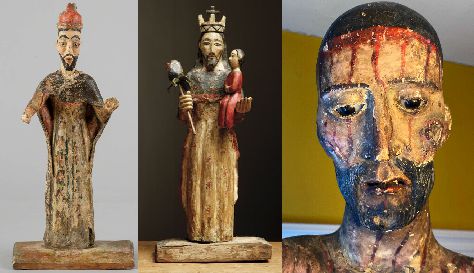
Early religious statuary was made from wood (like these “Bultos” from Mexico and New Mexico dating from the 18th century.
Molded white plaster became the standard manufacturing method for religious statuary during the 19th and 20th centuries. Millions of devotional figurines were produced in Italy and marketed worldwide in the period up to the 1980s.
Plaster figures are inexpensive to make (being poured into molds) but fragile and easily damaged. This is because the painting is not permanently bonded (fired in the kiln) as is the case with glazed porcelain.
Artistry in Glass is an Amazon Associate – we earn a commission from qualifying purchases
The following four cases are typical of the plaster statue repairs carried out by Artistry in Glass in our mid-town Tucson studio.
Case #1: St. Martin de Porres
The 5-foot tall statue of St Martin de Porres occupied pride of place on the left of the altar at the Holy Family Catholic Church in Tucson. St Martin, well-known as the first black saint was born in Lima, Peru, in 1579, and beatified, in 1837, by Pope Gregory XVI.
The background
Damage to antiques is normally done by the “big 4” culprits: cleaning ladies, moving men, pets, and grandchildren. In this unique case, the damage was the result of an act of inspired larceny:

In a dramatic demonstration of innocence and faith, a parishioner “borrowed” St Martin and took him home, hoping that he would intercede on behalf of her seriously ill mother.
Restoration – repair of religious statue
The compassionate parish priest and the church committee intervened and promised the guilty party that charges would not be brought if she would return St. Martin to the church.
All was well but the statue had sustained cosmetic damage during the escapade – in the form of chipped and missing paint.

St. Martin is restored by Artistry in Glass. We fix damaged plaster and chipped paint and refurbish the robe with stylish gold filigree decorations. The wooden rosary beads are carefully recreated.
Case #2: Baby Jesus
Nativity sets are an extremely popular item of Christian devotion – traditional brought out by families every year to celebrate Christmas. Many Nativity sets are passed down through multiple generations.
The background
Part of a family Nativity set, this Baby Jesus belonged to our customer’s grandmother and was of extreme sentimental value.
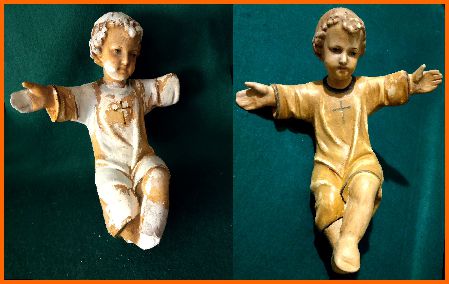
Badly damaged Baby Jesus is missing his left hand and both feet. The experts at Artistry in Glass sculpt replacement limbs out of 2-part epoxy and paint them to match the original finish.
Restoration – repair of religious statue
Special skill is required to restore antique plaster statutes because the material is very fragile and the paint is easily de-laminated. The crucial objective for the conscientious restorer is to create new parts but to maintain the original antique and “worn” appearance. These pieces have been “worn” by devotional caresses over many years and should not be made to appear pristine.
Case #3: St. Bernadette of Lourdes
The background
Bernadette Soubirous (1844-1879) was beatified by Pope Pius XI in 1925 who authenticated her visions of Mary and canonized her as “Our Lady of Lourdes”.
Our customer had inherited this historic 10-inch tall statue that had been purchased by a family member on her pilgrimage to Lourdes.

The battered and faded statue, dating from the early 20th century, is renovated by Artistry in Glass. Note the larger-than-life rendering of the hands – revealing the non-realistic folk art provenance.
Restoration – repair of religious statue
In this case, the damage was so severe that we agreed, in consultation with the customer, that a complete renovation would be appropriate. The item retains its authenticity as a legitimate family heirloom but “preserving” such a dilapidated condition was deemed unwise – so a “new” restoration was preferred.
Case #4: Italian Corpus Christi
The background
Our customer purchased this 19th century Corpus Christi in Italy for a considerable sum and the statue was seriously damaged in shipping back to the USA. The left foot was completely detached and serious cracks had developed in both arms due to impacts the brittle material sustained during shipping.
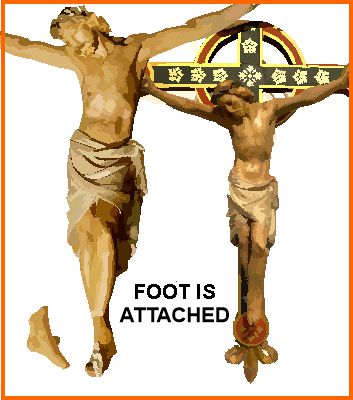
Large (30 cm tall) Corpus Christi attached to a wooden cross. 19th-century Italian plaster statue is finely modeled with realistic musculature.
Restoration – repair of religious statue
Artistry in Glass has more than 30 years of experience working with insurance companies. Our professional documentation and analysis of the damage and its cause resulted in the claim being accepted.
Once again, the challenge to the conservator is to restore without renovating. After filling cracks with special putty, skillful and sensitive application of paint preserves the appearance of the 200-year-old patina.
For those customers who cannot afford a professional restoration, very realistic modern reproductions like this 22-inch tall example are available on Amazon
Other repairs of religious statues
Many antique religious figures, especially those made in Mexico and the US Southwest, were hand-carved from wood and then hand-painted. Corpus Christi statues of this type are called “Bultos”. We restored the following two examples recently in our Artistry in Glass workshop.
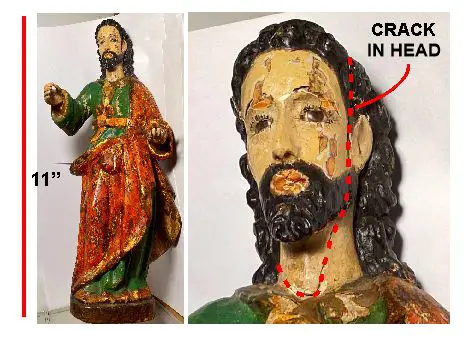
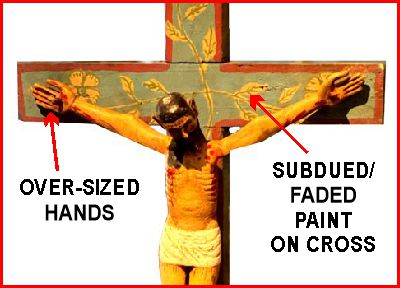
Replace damaged statues with new ones
Skilled restoration is very expensive but fortunately, if you are on a budget, reasonably priced replacements are now available. Modern reproductions are modeled in break-resistant resin rather than traditional plaster.
This 12-inch tall statue of St Martin de Porres (available on Amazon) is modeled in resin and beautifully painted.
Baby Jesus Christ in a manger (2-piece Nativity set, 4 inches long rendered in resin and realistically painted)
Artistry in Glass was your source for antique repair in Tucson
Check out this amazing selection of informative articles:-
- Where can I get antiques repaired?
- Are broken antiques worth fixing?
- How to fix a broken picture frame
- How to repair a broken china plate
- How to repair a broken china teapot
- How to fix a broken marble slab
- How to repair a broken china coffee mug
- How to repair a 2000-year-old sculpture
- All about repairing stained-glass lampshades
- How to care for your stained glass skylight
- How to repair Dalle de Verre
- Is stained glass worth repairing?
- To repair or toss out?
- Tucson crystal & china repair a division of Artistry in Glass
- What to do with broken antiques
- Is lead crystal dangerous?
- Repairing an antique Mexican statue
- Repairing religious statues
- The history of Swarovski crystal figurines
- How to find the value of a Swarovski Crystal figurine
- Have Swarovski crystal figurines lost value since 2009?
- How to collect Swarovski annual ornaments
- How to display Swarovski crystal figurines
- How to authenticate a Swarovski crystal figurine
- How to display Swarovski annual ornaments
- How to clean Swarovski crystal figurines
- How to repair a Swarovski crystal mouse
- How to repair a Swarovski annual ornament
- How to repair a Swarovski crystal train set
- Fixing broken wine glass stems
- How to clean cloudy glasses
- Why do wine glasses have stems?
- Swarovski Crystal Figurines
- How to repair a chip in a wine glass
- How to fix a scratched glass tabletop
- How to replace a broken patio tabletop






